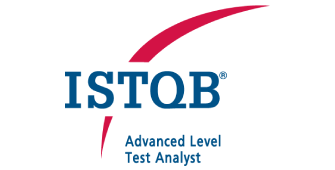 Sell tickets and manage registrations
Sell tickets and manage registrations
 View my tickets and registrations
View my tickets and registrations
 Sell more tickets through digital marketing
Sell more tickets through digital marketing
 Add an event calendar to your website
Add an event calendar to your website
 Find events by location and categories
Find events by location and categories
ISTQB Advanced – Test Analyst 4 Days Training in Perth

Course Description:
This Advanced Level Course builds on the knowledge and skills acquired at the Foundation Level. In this Course, you will learn the appropriate Test Analyst analysis and design tasks for different lifecycle models. You will also learn when it is most appropriate to use low and high-level test cases, and the steps and considerations necessary when executing tests. The Course allows you to participate in Risk Management activities and analyze a specification to determine types of defects. It also enables you to analyze defect taxonomy for applicability in a given situation and specify test cases using a range of specification-based testing techniques. You will learn to analyze a use case/user interface and a Requirements specification/user story, and identify problems using the checklist.
Holding the ISTQB Advanced Level Test Analyst Certificate entitles you to use the Certified Tester Advanced Level acronym CTAL-TA.
Course Topics:
● Testing Process
● Testing in the Software Development Lifecycle
● Test Planning, Monitoring, and Control
● Test Analysis
● Test Design
● Test Implementation
● Test Execution
● Evaluating Exit Criteria and Reporting
● Test Closure Activities
● Test Management: Responsibilities for the TA
● Test Progress Monitoring and Control
● Distributed, Outsourced and Insourced Testing
● Test Analyst’s Tasks in Risk-Based Testing
● Test Techniques
● Specification-Based Techniques
● Equivalence Partitioning and Boundary Value Analysis
● Decision Tables
● Cause-Effect Graphing
● State Transition Testing
● Combinatorial Testing: Pairwise
● Combinatorial Testing: Orthogonal Arrays
● Combinatorial Testing: Classification Trees
● Use Case Testing
● User Story Testing
● Domain Analysis
● Combining Techniques
● Defect-Based Techniques
● Experienced-Based Techniques
● Applying the Most Appropriate Technique
● Testing of Software Characteristics
● Introduction
● Quality Characteristics for Business Domain Testing
● Accuracy Testing
● Suitability Testing
● Interoperability Testing
● Lunch
● Usability Testing
● Accessibility Testing
● Learning Game: QC Pairs
● Reviews
● Introduction
● Test Analyst Role
● Using Checklists in Reviews
● Defect Management
● Introduction
● When can a defect be detected?
● Defect Report Fields
● Defect Classification
● Root Cause Analysis
● Test Tools
● Introduction
● Test Design Tools
● Test Data Preparation Tools
● Automated Test Execution Tools
Learning Goals:
● Analyze a given scenario, including a project description and lifecycle model, to determine appropriate tasks for the Test Analyst during the analysis and design phases.
● Analyze a project scenario to determine the most appropriate use of low-level (concrete) and high-level (logical) test cases.
● Determine the steps and considerations to be taken for a given scenario when executing tests.
● Participate in Risk identification, perform Risk Assesment, and propose appropriate Risk mitigation for a given project situation.
● Write test cases for a given specification item applying the equivalence partitioning, boundary value analysis, decision table, state transition, pairwise test, classification tree, use case, and domain analysis test design techniques to achieve defined levels of coverage.
● Analyze a system, or its Requirement specification, to determine types of defects to be found and select the appropriate specification-based technique(s).
● Analyze the given defect taxonomy for applicability in a given situation using the criteria of a good taxonomy.
● Specify exploratory tests and explain how to report the results for a given scenario.
● Determine which specification-based, defect-based, experience-based techniques should be applied for a given project situation to achieve the specific Goals.
● Outline the suitable approaches for a given project context to verify and validate both the implementation of the usability Requirements and the fulfillment of the user’s expectations.
● Analyze a use case/user interface and identify problems according to the checklist provided in the syllabus.
● Analyze a Requirements specification/user story and identify problems according to the checklist provided in the syllabus.
● Identify, gather, and record classification information for a given defect.
Course Agenda:
Day 1
● Session 1: Testing Process
● Session2: Test Management: Responsibilities for the TA
● Session 3: Test Techniques
Day 2
● Session 3: Test Techniques (continued)
Day 3
● Session 4: Testing of Software Characteristics
● Session 5: Reviews
Day 4
● Session 6: Defect Management
● Session 7: Test Tools
Who can Attend?
● Software Developers and Testers

